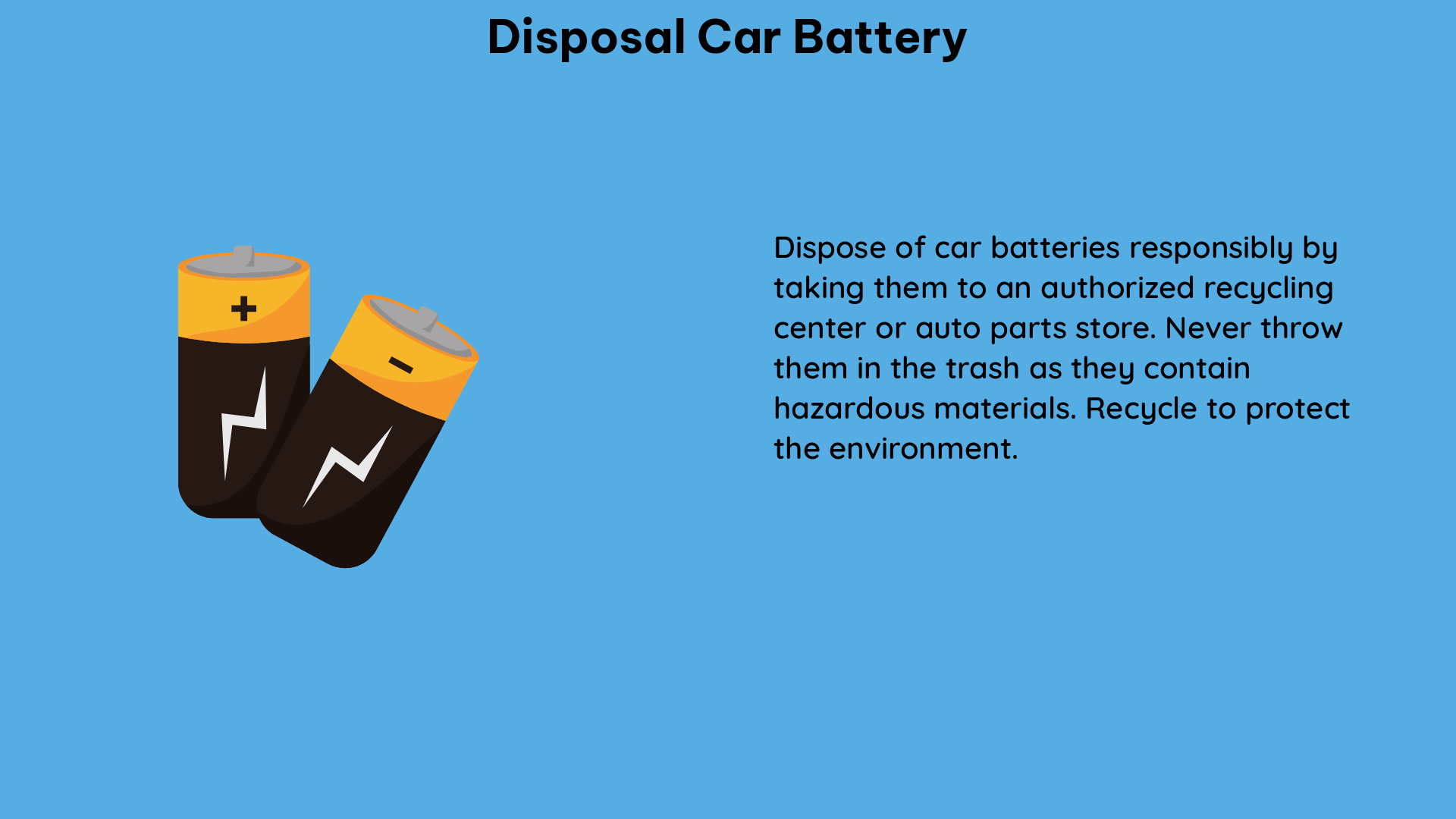Disposing of car batteries, particularly lithium-ion batteries, is a critical issue due to their potential hazards and the valuable materials they contain. These batteries must be handled with care to prevent environmental and safety risks, while also ensuring the recovery of valuable resources through proper recycling processes.
Understanding the Hazards of Car Battery Disposal
According to the US Environmental Protection Agency (EPA), most lithium-ion batteries are likely to be classified as hazardous wastes when disposed of, carrying the waste codes D001 and D003 for ignitable and reactive hazardous wastes, respectively. This is because they may catch fire or explode if not handled carefully, especially when discarded and potentially mishandled.
The hazardous nature of these batteries is primarily due to the following factors:
- Flammability: Lithium-ion batteries contain flammable organic electrolytes that can ignite if the battery is damaged or overheated.
- Reactivity: The lithium metal and other reactive materials in the batteries can react violently with water or other substances, posing a risk of explosion or fire.
- Toxicity: Some of the materials used in lithium-ion batteries, such as cobalt and nickel, can be toxic if not properly contained and disposed of.
The Importance of Recycling Car Batteries

The EPA emphasizes the importance of recycling used lithium-ion batteries to conserve critical minerals and other valuable materials, as well as to prevent problems caused by inappropriate disposal. In the US, there are no comprehensive policies for electric vehicle (EV) battery reuse and recycling, and the industry is still in its early stages. However, the potential benefits of recycling are significant.
A study on electric vehicle recycling in China found that recycling one metric ton of lithium-ion batteries could:
- Save 7.1 metric tons of standard coal
- Reduce carbon dioxide emissions by 6.2 metric tons
- Reduce water consumption by 23.4 metric tons
These figures highlight the substantial environmental and resource-saving benefits of properly recycling car batteries.
Recycling Methods for Car Batteries
There are several methods for recycling lithium-ion batteries, each with its own advantages and challenges. These methods include:
- Mechanical Processes:
- Involve shredding and separating the battery components
- Can recover materials such as aluminum, copper, and plastic
-
Typically have lower recovery rates for critical materials like lithium, cobalt, and nickel
-
Pyrometallurgical Processes:
- Involve high-temperature smelting of the battery components
- Can recover metals like cobalt, nickel, and copper
-
Require significant energy input and can result in the loss of some materials
-
Hydrometallurgical Processes:
- Involve leaching the metals from the battery components using aqueous solutions
- Can achieve higher recovery rates for critical materials like lithium, cobalt, and nickel
- Require less energy input compared to pyrometallurgical processes
These recycling processes can recover valuable materials such as lithium, cobalt, nickel, and manganese, which can then be reused in the production of new batteries.
Technical Specifications of Car Batteries
Lithium-ion batteries used in EVs typically have the following technical specifications:
| Specification | Range |
|---|---|
| Nominal Voltage | 3.6-3.7 volts |
| Capacity | 20 to 60 ampere-hours (Ah) |
| Energy Density | 150-200 watt-hours per kilogram (Wh/kg) |
However, newer battery technologies, such as lithium-ion phosphate (LiFePO4) and lithium-ion nickel manganese cobalt oxide (LiNiMnCoO2), can achieve energy densities of up to 250 Wh/kg.
Conclusion
The disposal of car batteries, particularly lithium-ion batteries, is a critical issue that requires proper management to prevent hazards and conserve valuable resources. Recycling these batteries can provide significant environmental and economic benefits, and the industry is expected to grow as the demand for EVs increases. By understanding the hazards, the importance of recycling, and the various recycling methods available, car owners and industry stakeholders can play a crucial role in ensuring the safe and sustainable disposal of car batteries.
Reference:
– Lithium-Ion Battery Recycling
– Electric Vehicle Recycling in China
– Recycling of Lithium-Ion Batteries: A Critical Review

The lambdageeks.com Core SME Team is a group of experienced subject matter experts from diverse scientific and technical fields including Physics, Chemistry, Technology,Electronics & Electrical Engineering, Automotive, Mechanical Engineering. Our team collaborates to create high-quality, well-researched articles on a wide range of science and technology topics for the lambdageeks.com website.
All Our Senior SME are having more than 7 Years of experience in the respective fields . They are either Working Industry Professionals or assocaited With different Universities. Refer Our Authors Page to get to know About our Core SMEs.